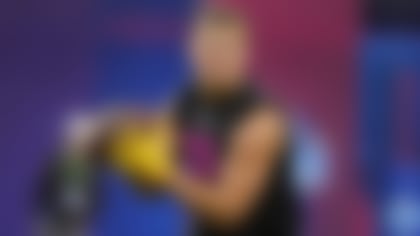NEW YORK -- In full cadet uniform, Army's Caleb Campbell sat upright in one of Radio City Music Hall's plush seats. On his head was a Detroit Lions ballcap.
Cupped in his left hand was his ticket out of Iraq.
It was the card the Lions turned in to take Campbell 218th overall on Sunday at the NFL draft, changing his post-graduation plans to lead a platoon, one that may well have seen combat.
"I'm very fortunate," Campbell said. "Without the Army and the academy ... I wouldn't be able to do this."
Campbell is the first Army football player to benefit from a new policy allowing athletes with a chance to play professionally to complete their service by serving as recruiters and in the reserves.
Campbell will still be on active duty. He'll serve as a recruiter, spending his Tuesday off days from the Lions visiting high schools and working. If his career lasts more than two seasons, he will have the option of buying out the last three years of his active-duty commitment in exchange for six years in the reserves.
Meanwhile, his former teammates and classmates all face the prospect of going to war in Iraq, where more than 4,000 servicemen and women have been killed in the war that's been going on for more than five years with no end in sight.
Campbell wouldn't hesitate to join them.
"I didn't come to the academy to play football," he said. "I came to the academy to become an officer."
He initially had misgivings about passing up on the chance to lead a platoon. But he came around.
Lions coach Rod Marinelli, who served a tour in Vietnam, said on TV that picking the 6-foot-2, 229-pound Campbell was no flyer, and that the former Black Knights defensive back would be used as a linebacker, at least initially. The son of GM Matt Millen is a cadet at West Point.
Campbell "embodies what the academy is all about, and that's what everyone in this country should be trying to be," Millen said. "He's got skills, he's got desire and he's going to get a great opportunity."
On a star-starved second day at the draft, Campbell was the most popular guy in the room. Whenever he appeared on camera, fans chanted "Ca-leb Camp-bell!" and "U-S-A!" with only minimal egging on from ESPN staff.
"This is incredible," Campbell said. "It gives me goosebumps. It's awesome."
SWAP MEET: NFL decision-makers were a finicky lot at the NFL draft, making a record 33 trades on Saturday and Sunday, surpassing the previous record of 28 from the 2004 draft.
An even dozen trades came in the first two rounds on Saturday. Sunday, fittingly, began with a trade, as Detroit moved up to begin the day by taking running back Kevin Smith, who almost broke the college rushing record of former Lions star Barry Sanders.
At one point the New York Jets traded themselves a pick. On Saturday, the Jets traded up to Green Bay's No. 30 spot, giving up their second rounder and their fourth-rounder, No. 113 overall.
The Jets used the 113th pick to take defensive back Dwight Lowery from San Jose State.
Cleveland managed to do the same thing in the sixth round, washing the 191st overall pick through Philadelphia to net them receiver Paul Hubbard from Wisconsin.
QUARTER-PACK: With Brett Favre retired and backup Aaron Rodgers still untested, Green Bay chose two quarterbacks. The Packers took Louisville's Brian Brohm in the second round, and then grabbed LSU's Matt Flynn in the seventh.
HOT, HOT, HOT: Although Southern California players were the top commodity at the draft, smaller schools like Appalachian State had a couple players taken too. The Mountaineers had two players picked, as did Richmond, Northern Iowa and Montana among the small schools.
The Mountaineers, who had receiver Dexter Jackson and defensive back Corey Lynch taken, won the Division I-AA national championship and upset Michigan this season, while Richmond (receiver Arman Shields, running back Tim Hightower) was a national semifinalist.
Northern Iowa had two offensive linemen taken, guard Brandon Keith and Chad Rinehart, while Montana had defensive end Kroy Biermann and running back Lex Hilliard selected.
There were even a couple picks from some really small schools.
Cleveland grabbed linebacker Alex Hall of St. Augustine's, a Division II school in North Carolina, while the Panthers took guard Mackenzy Bernadeau from Division II's Bentley.
Indianapolis took receiver Pierre Garcon from perennial Division III power Mount Union, Philadelphia's Andy Studebaker went to Division III Wheaton.
REMEMBER HIM?: Jackson has a tough name to live up to in Tampa Bay. The Buccaneers selected the Appalachian State receiver late in the second round, at No. 58. Of course, the Bucs already had a Dexter Jackson. He played safety, and all he did in a Bucs uniform was win the Super Bowl MVP in 2003 for them. No pressure.
SPECIAL MOMENTS: Washington began the sixth round by taking the draft's first special teams player, Durant Brooks of Georgia Tech. The athletic punting prospect is known to study video of kick returners to gauge their tendencies, and can hold on kicks, too.
Later in the round, the New Orleans Saints took Wisconsin kicker Taylor Melhaff, and Seattle got into the mix, picking two special teams players.
The Seahawks drafted long-snapper Tyler Schmitt from San Diego State in the sixth round, then took kicker Brandon Coutu in the seventh.
THROW-INS: Before the second day began at 10 a.m., the NFL distributed ticket forms for fans to fill out. They were collected by NFL reps after the draft ended more than eight and a half hours later. Fans who stayed the whole second day will be able to get tickets to the 2009 draft. ... Almost every mention of the New England Patriots, whether for picks or trades, was met with boos from the crowd, both the hordes on Saturday and the small band of hard-core fans who attended on Sunday. ... For the third time in five years, the Heisman Trophy winner wasn't eligible to be taken. Of course, Tim Tebow wasn't eligible, just like Matt Leinart was in 2005, the year before Arizona made him the 10th pick. 2003 winner Jason White of Oklahoma wasn't eligible either, but didn't get picked when he came out in 2005. ... Among the more notable college football programs without a single player drafted were Alabama, Texas Tech, Oklahoma State, Washington, Stanford, Syracuse and Utah. ... Mr. Irrelevant was David Vobora, a linebacker from Idaho.
Copyright 2008 by The Associated Press



